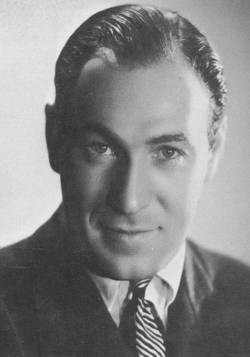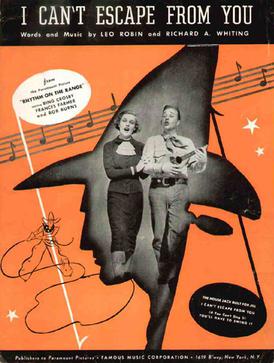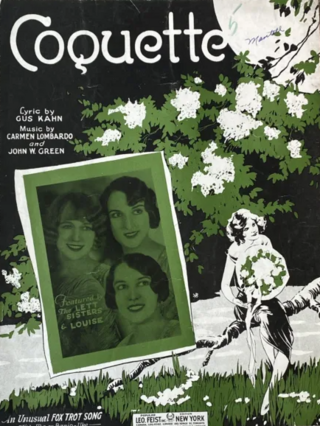This article needs additional citations for verification .(May 2014) |
"Linda" is a popular song written, taking its name from then-one-year-old Linda McCartney. It was written by Jack Lawrence and published in 1946.
This article needs additional citations for verification .(May 2014) |
"Linda" is a popular song written, taking its name from then-one-year-old Linda McCartney. It was written by Jack Lawrence and published in 1946.
The song was written in 1942 when Lawrence was in the service during World War II, taking its name from the then one-year-old daughter of his attorney, Lee Eastman. (His daughter was Linda Eastman McCartney, future first wife of the Beatle Paul McCartney.) [1] [2]
The song did not get published until after Lawrence left the military, and was then recorded by a number of performers, but the biggest hit was by Ray Noble's orchestra (with a vocal by Buddy Clark). [3] Other charted versions were by Charlie Spivak (vocal by Tommy Mercer); Paul Weston (vocal by Matt Dennis); and by Larry Douglas. [4]
The recording by Ray Noble and Buddy Clark was recorded on November 15, 1946, and released by Columbia Records. [5] It first reached the Billboard Best Sellers chart on March 21, 1947, and lasted thirteen weeks on the chart, peaking at number two.[ citation needed ]
The recording by Charlie Spivak was recorded on November 19, 1946, and released by RCA Victor Records. [6] It first reached the Billboard on March 28, 1947, and lasted nine weeks on the chart, peaking at number six.[ citation needed ]
In 1962, Jan & Dean did a version of the song for Liberty Records that reached #28 on the Billboard Hot 100.[ citation needed ]
Note: There is another song titled "Linda", written by Ann Ronell for the film score of The Story of G.I. Joe (1945). It was nominated for an Oscar.
"Temptation" is a popular song published in 1933, with music written by Nacio Herb Brown and lyrics by Arthur Freed.
"Ballerina" is a popular song, sometimes known as "Dance, Ballerina, Dance". The song was written by Carl Sigman with lyrics by Sidney Keith 'Bob' Russell. Published in 1947, the tune is listed as ASCAP Title Code 320012517.
"Suddenly There's a Valley" is a popular song written by Chuck Meyer and Biff Jones and published in 1955.

"Back in Your Own Back Yard" is a popular song. Officially the credits show it as written by Al Jolson, Billy Rose, and Dave Dreyer; in fact, Billy Rose was exclusively a lyricist, Dreyer a composer, and Al Jolson a performer who was often given credits so he could earn some more money, so the actual apportionment of the credits would be likely to be music by Dreyer, lyrics by Rose, and possibly some small contribution by Jolson.
"My Dreams Are Getting Better All the Time" is a 1945 popular song.

Buddy Clark was an American popular singer of the Big Band era. He had some success in the 1930s, but his career truly blossomed in the late 1940s, after his return from service in World War II, and he became one of the nation's top crooners. He died in a plane crash in 1949.
"The One I Love (Belongs to Somebody Else)" is a popular song composed by Isham Jones with lyrics by Gus Kahn. The song was recorded by Isham Jones' Orchestra on December 21, 1923, at Brunswick Studios in New York City, and published on January 7, 1924. On January 17 in Chicago, Jones recorded another version, with Al Jolson on lead vocals. Both versions made the charts that Spring, with Jolson's peaking at number 2, and Jones' at number 5. Sophie Tucker recorded her version February 1924, released on Okeh 40054.
"Imagination" is a popular song with music written by Jimmy Van Heusen and the lyrics by Johnny Burke. The song was first published in 1940. The two best-selling versions were recorded by the orchestras of Glenn Miller and Tommy Dorsey in 1940.

"I'll Get By (As Long as I Have You)" is a popular song with music by Fred E. Ahlert and lyrics by Roy Turk that was published in 1928. Versions by Nick Lucas, Aileen Stanley and, most successfully, Ruth Etting, all charted in America in 1929.
"Don't Take Your Love from Me" is a popular song written by Henry Nemo and published in 1941. Mildred Bailey first recorded this song in 1940 before publication. It was introduced that year by singer Joan Brooks.

"Somebody Loves Me" is a popular song, with music written by George Gershwin, and lyrics by Ballard MacDonald and Buddy DeSylva. The song was published in 1924 and featured in George White's Scandals of 1924.
"Galway Bay" is the name of at least two different songs.
"Mañana " is a popular song that was written by Peggy Lee and her first husband Dave Barbour and published in 1947. Peggy Lee recorded the song on November 25, 1947, with Dave Barbour's orchestra as backing. Released by Capitol Records, it became her biggest chart hit. For the week ending January 23, 1948, the single entered Billboard's Best Sellers chart, where it spent 21 weeks, nine of those at number one.

"I Wonder Who's Kissing Her Now" is a popular song. The music was written by Harold Orlob, the lyrics by Will M. Hough and Frank R. Adams. Orlob worked for Joseph E. Howard generating songs for Howard's productions and Howard presented the song as his own work for several years. The song was published in 1909 and was first introduced in the 1909 musical The Prince of To-Night when it was performed by Henry Woodruff.
"(I Love You) for Sentimental Reasons" is a popular song written by Ivory "Deek" Watson, founding member of the Ink Spots and of the Brown Dots, and William "Pat" Best, founding member of the Four Tunes.
"(You'd Be So) Easy to Love" is a popular song written by Cole Porter for William Gaxton to sing in the 1934 Broadway show Anything Goes. However Gaxton was unhappy about its wide vocal range and it was cut from the musical. Porter re-wrote it for the 1936 film Born to Dance, where it was introduced by Eleanor Powell, James Stewart, and Frances Langford under its alternate title, "Easy to Love". The song was later added to the 1987 and 2011 revivals of Anything Goes under the complete title "You’d Be So Easy to Love".
"For You" is a song written by Joe Burke and Al Dubin in 1930. It was introduced in the Mack Sennett short Billboard Girl (1932) when it was sung by Bing Crosby. The best known version was from musician Rick Nelson in 1964, when it peaked at #6 on the Billboard Hot 100 and at #66 on the year end.
"Can't We Be Friends?" is a 1929 song with lyrics by Paul James and music by Kay Swift, introduced on Broadway in The Little Show by Libby Holman. It was later recorded by many artists including Bing Crosby, Ella Fitzgerald, and Frank Sinatra.

"I Can't Escape from You" is a song written music by Richard A. Whiting and lyrics by Leo Robin for the 1936 Paramount Film "Rhythm on the Range", and first introduced in the film when Bing Crosby sang it to Frances Farmer. Crosby recorded it for Decca Records that same year with the Jimmy Dorsey Orchestra and it was in the hit parade for 11 weeks reaching a peak position of No. 7. Crosby recorded the song again in 1954 for his album Bing: A Musical Autobiography.

"Coquette" is a 1928 fox trot jazz standard. It was composed by Johnny Green and Carmen Lombardo, with lyrics by Gus Kahn. Guy Lombardo had great success with the song in 1928.